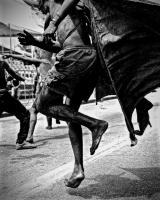 There is a present-day tendency to retreat into the realms of dystopia, of catastrophe and disaster, of failed states and fascism, of environmental collapse and economic apocalypse. This tendency is neither wrong nor mistaken. Yet it is often suffocating, only adding to the pressurized dread of the era, offering no antidote to the plague of cynicism, the chokehold of hopelessness, the drift, or, perhaps, the plunge, into a miasma of pessimism and hopelessness. Of course, there are other tendencies, other possibilities, other ways forward. Here, we briefly mention five recent books, loosely grouped under the banners of anarchism, autonomy, and utopia, that propose better worlds to come – as better must come.
There is a present-day tendency to retreat into the realms of dystopia, of catastrophe and disaster, of failed states and fascism, of environmental collapse and economic apocalypse. This tendency is neither wrong nor mistaken. Yet it is often suffocating, only adding to the pressurized dread of the era, offering no antidote to the plague of cynicism, the chokehold of hopelessness, the drift, or, perhaps, the plunge, into a miasma of pessimism and hopelessness. Of course, there are other tendencies, other possibilities, other ways forward. Here, we briefly mention five recent books, loosely grouped under the banners of anarchism, autonomy, and utopia, that propose better worlds to come – as better must come.
To read
18.03.2021 | by The Public Archive
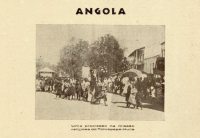 References to Portugal’s epic, seafaring past like these litter this city – there is even a Vasco da Gama shopping mall. But until now, there has never been a single explicit reference, memorial or monument in Portugal’s public space to its pioneering role in the transatlantic slave trade, nor any acknowledgement of the millions of lives that were stolen between the 15th and 19th centuries.
References to Portugal’s epic, seafaring past like these litter this city – there is even a Vasco da Gama shopping mall. But until now, there has never been a single explicit reference, memorial or monument in Portugal’s public space to its pioneering role in the transatlantic slave trade, nor any acknowledgement of the millions of lives that were stolen between the 15th and 19th centuries.
Games Without Borders
15.03.2021 | by Ana Naomi de Sousa
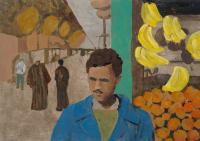 It’s a common place to say that the memory production drags with it, inevitably and concomitantly, the forgetfulness production. There are many ways of forgetfulness, the most insidious of which is, undoubtedly, the memory erasure, the past rewriting as part of a deliberated strategy of intervention in the present.
It’s a common place to say that the memory production drags with it, inevitably and concomitantly, the forgetfulness production. There are many ways of forgetfulness, the most insidious of which is, undoubtedly, the memory erasure, the past rewriting as part of a deliberated strategy of intervention in the present.
Games Without Borders
13.03.2021 | by António Sousa Ribeiro
 Certainly, the virtual dimension will take a new importance, also in light of the massive use of digital tools that this new reality brought with itself, but also in relation to the fact that artists might end up not traveling a lot like before…who knows! The art that will change is only in relation to travel and distance. What could definitely change might be the distribution channels, moving more and more into streaming and digital platforms…but I really hope that this won’t happen. The emotion that live art arouses is incomparable.
Certainly, the virtual dimension will take a new importance, also in light of the massive use of digital tools that this new reality brought with itself, but also in relation to the fact that artists might end up not traveling a lot like before…who knows! The art that will change is only in relation to travel and distance. What could definitely change might be the distribution channels, moving more and more into streaming and digital platforms…but I really hope that this won’t happen. The emotion that live art arouses is incomparable.
Face to face
12.03.2021 | by Marcos Jinguba
 Danting is clear with her intention. She was not in Italy to problematize or victimize the refugees or migrants. She was there to tell a story with her own poetics and narrative. I can not agree more with Rainer Maria Rilke that art should not be critiqued, and I do believe that I must fail in writing any critique, since I only follow my own instinctive way of following art. In this sense, and in my personal perception, I am glad to have discovered a filmic narrative from a Chinese Baip filmmaker. Her name is Danting Chen.
Danting is clear with her intention. She was not in Italy to problematize or victimize the refugees or migrants. She was there to tell a story with her own poetics and narrative. I can not agree more with Rainer Maria Rilke that art should not be critiqued, and I do believe that I must fail in writing any critique, since I only follow my own instinctive way of following art. In this sense, and in my personal perception, I am glad to have discovered a filmic narrative from a Chinese Baip filmmaker. Her name is Danting Chen.
Stages
07.03.2021 | by Cheong Kin Man
 The oppressive policies and structural inequities that underlie the conditions of poor and working class people’s lives here and abroad date from the first invasion of native territories, and the last few decades have exacerbated these conditions. What our older films reveal is the similarity of conditions now with what existed 50 years ago.
The oppressive policies and structural inequities that underlie the conditions of poor and working class people’s lives here and abroad date from the first invasion of native territories, and the last few decades have exacerbated these conditions. What our older films reveal is the similarity of conditions now with what existed 50 years ago.
Face to face
03.03.2021 | by Keelyn Bradley
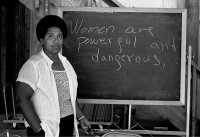 Audre Lorde asks, “What does it mean when the tools of a racist patriarchy are used to examine the fruits of that same patriarchy?” Lorde’s critique of hierarchies within what is then a predominantly white, middle-class, heteronormative, able-bodied second-wave feminism invites reevaluation of the chalk circles of individual identity that fix structural inequality and prevent viable liberation from taking shape. An existentialism disconnected from dynamic modes of praxis grounded in “the interdependence of mutual (nondominant) differences” fortifies oppression.
Audre Lorde asks, “What does it mean when the tools of a racist patriarchy are used to examine the fruits of that same patriarchy?” Lorde’s critique of hierarchies within what is then a predominantly white, middle-class, heteronormative, able-bodied second-wave feminism invites reevaluation of the chalk circles of individual identity that fix structural inequality and prevent viable liberation from taking shape. An existentialism disconnected from dynamic modes of praxis grounded in “the interdependence of mutual (nondominant) differences” fortifies oppression.
Mukanda
03.03.2021 | by Keelyn Bradley
 The events of the past six years have sharpened Gilroy's observations. At the same time, they have made it increasingly clear that, despite the real progress achieved, attempts to maintain privileges based on structural and systemic inequality, whether in terms of class, gender or race, have become even more obstinate. Attempts that go hand in hand with the futile but devastating efforts to deny history and impose the erasure of memory.
The events of the past six years have sharpened Gilroy's observations. At the same time, they have made it increasingly clear that, despite the real progress achieved, attempts to maintain privileges based on structural and systemic inequality, whether in terms of class, gender or race, have become even more obstinate. Attempts that go hand in hand with the futile but devastating efforts to deny history and impose the erasure of memory.
To read
18.02.2021 | by Paulo de Medeiros
 And so it was in these places of refuge that Black Lives Matter arose, a largely Northern- and Western-born protest movement against persistent racial discrimination in many forms. It is organic and leaderless like the Great Migration itself, bearing witness to attacks on African-Americans in the unfinished quest for equality. The natural next step in this journey has turned out to be not simply moving to another state or geographic region but moving fully into the mainstream of American life, to be seen in one’s full humanity, to be able to breathe free wherever one lives in America.
And so it was in these places of refuge that Black Lives Matter arose, a largely Northern- and Western-born protest movement against persistent racial discrimination in many forms. It is organic and leaderless like the Great Migration itself, bearing witness to attacks on African-Americans in the unfinished quest for equality. The natural next step in this journey has turned out to be not simply moving to another state or geographic region but moving fully into the mainstream of American life, to be seen in one’s full humanity, to be able to breathe free wherever one lives in America.
Games Without Borders
17.02.2021 | by Isabel Wilkerson
 “The amount we know about our African heritage varies from individual to individual,” says Johnson Artur. What they do have in common however, is a history of struggle against a commonly encountered resistance to the presence of black people in Russia. “Those who grew up and live in Russia still have to justify on a daily basis the fact that they are Russians too.” Johnson Artur hopes her project will go some to connecting and making visible the generation of black Russians that have grown up calling the country home.
“The amount we know about our African heritage varies from individual to individual,” says Johnson Artur. What they do have in common however, is a history of struggle against a commonly encountered resistance to the presence of black people in Russia. “Those who grew up and live in Russia still have to justify on a daily basis the fact that they are Russians too.” Johnson Artur hopes her project will go some to connecting and making visible the generation of black Russians that have grown up calling the country home.
Mukanda
17.02.2021 | by Red Africa
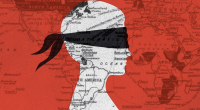 Ignoring the central role of race and colonialism in world affairs precludes an accurate understanding of the modern state system.
Worldwide protests against police racism and brutality and the toppling of statues commemorating white supremacists have led to a public reckoning in the United States and many other countries—forcing citizens and governments to confront the historical legacy of systemic racism and the enduring inequalities it has created.
Ignoring the central role of race and colonialism in world affairs precludes an accurate understanding of the modern state system.
Worldwide protests against police racism and brutality and the toppling of statues commemorating white supremacists have led to a public reckoning in the United States and many other countries—forcing citizens and governments to confront the historical legacy of systemic racism and the enduring inequalities it has created.
Games Without Borders
16.02.2021 | by Gurminder K. Bhambra, Yolande Bouka , Randolph B. Persaud, Olivia U. Rutazibwa, Vineet Thakur, Duncan Bell, Karen Smith, Toni Haastrup and Seifudein Adem
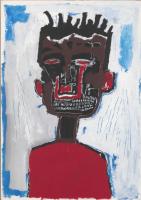 Jean-Michel Basquiat wasn’t a fan of interviews, and on the rare occasions he surrendered to them, his responses were terse—even cryptic. Despite this, the painter’s words reveal a great deal about his inspirations and his all-consuming process. They offer a window into his approach, in which he remixed references from art history, the streets of 1980s New York, and the tumult of pop culture with his Carribean heritage and his identity as a young black man.
Jean-Michel Basquiat wasn’t a fan of interviews, and on the rare occasions he surrendered to them, his responses were terse—even cryptic. Despite this, the painter’s words reveal a great deal about his inspirations and his all-consuming process. They offer a window into his approach, in which he remixed references from art history, the streets of 1980s New York, and the tumult of pop culture with his Carribean heritage and his identity as a young black man.
Stages
08.02.2021 | by Alexxa Gotthardt
 Lovers rock helped to change perceptions of black music in the British media. Despite its transnational origin, it is considered a distinctly British genre, the first post-colonial music genre to emerge in the UK, before other internationally known genres such as Brit Funk, Acid House, Jungle, UK garage, Dubstep, Grime, or UK drill came about.
Lovers rock helped to change perceptions of black music in the British media. Despite its transnational origin, it is considered a distinctly British genre, the first post-colonial music genre to emerge in the UK, before other internationally known genres such as Brit Funk, Acid House, Jungle, UK garage, Dubstep, Grime, or UK drill came about.
Afroscreen
07.02.2021 | by Marcos Cardão
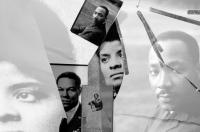 Black historic and political figures have been rendered as vanquishing heroes as well. Noble, brave and transcendent, they have remarkable stories. We tremble in awe before the recounting of Frederick Douglass escaping from slavery and Ida B. Wells narrowly evading the Klan in Memphis, saving her own life — then, through her investigative journalism into the practice of lynching, saving the lives of countless others. Martin Luther King Jr., who survived threats, bombs and jail cells before falling to an assassin’s bullets, has been rendered as the ultimate hero. His depiction is messianic. And though he was a key member of a vast and complex movement, he is often presented as singular. This is the way we tell history in the American public sphere.
Black historic and political figures have been rendered as vanquishing heroes as well. Noble, brave and transcendent, they have remarkable stories. We tremble in awe before the recounting of Frederick Douglass escaping from slavery and Ida B. Wells narrowly evading the Klan in Memphis, saving her own life — then, through her investigative journalism into the practice of lynching, saving the lives of countless others. Martin Luther King Jr., who survived threats, bombs and jail cells before falling to an assassin’s bullets, has been rendered as the ultimate hero. His depiction is messianic. And though he was a key member of a vast and complex movement, he is often presented as singular. This is the way we tell history in the American public sphere.
To read
05.02.2021 | by Imani Perry
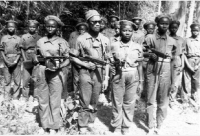 It is February 1964—one year into the armed struggle for independence in Guinea Bissau against Portuguese colonial rule. Cabral, the independence struggle’s leader, had called a conference in Cassaca for his African Party for the Independence of Guinea and Cape Verde (PAIGC) fighters to re-organize and address inter-party grievances.
The Cabral as seen in this and similar photographs, with his defiant stance, dark glasses, and signature knitted stocking cap in spite of the West African heat, would become the iconic image of the West African country. More than fifty years later, the image is still used to signify both Guinea Bissau’s victory in the 11-year independence struggle and the country’s continued hopes for the future. But what about the faces of the young women surrounding the independence hero? Directly to Cabral’s left in the image stands a round-faced, then 14-year old girl, Joana Gomes.
It is February 1964—one year into the armed struggle for independence in Guinea Bissau against Portuguese colonial rule. Cabral, the independence struggle’s leader, had called a conference in Cassaca for his African Party for the Independence of Guinea and Cape Verde (PAIGC) fighters to re-organize and address inter-party grievances.
The Cabral as seen in this and similar photographs, with his defiant stance, dark glasses, and signature knitted stocking cap in spite of the West African heat, would become the iconic image of the West African country. More than fifty years later, the image is still used to signify both Guinea Bissau’s victory in the 11-year independence struggle and the country’s continued hopes for the future. But what about the faces of the young women surrounding the independence hero? Directly to Cabral’s left in the image stands a round-faced, then 14-year old girl, Joana Gomes.
Games Without Borders
04.02.2021 | by Ricci Shryock
 Despite the importance of chattel slavery to the making of Portugal and its overseas empire, this terrifying history of black bondage is entirely muted in the public memory of Lisbon. In contrast to the (recently established and far overdue) National Museum of African American History and Culture in the United States or the Museu Afro Brasilin São Paulo, Brazil, there are no such museums or reckoning public memorials in Lisbon along the lines of the Mémorial de l’Abolition d’Esclavage as in Nantes, France. More recently, however, a slavery museum was established in the historic “Mercado de Escravos” (Slave Market) of the southern Portuguese port of Lagos, which is said to be the site of the first trade in enslaved Africans in Europe. Yet, Lisbon remains largely silent on its legacy of white terror and black captivity.
Despite the importance of chattel slavery to the making of Portugal and its overseas empire, this terrifying history of black bondage is entirely muted in the public memory of Lisbon. In contrast to the (recently established and far overdue) National Museum of African American History and Culture in the United States or the Museu Afro Brasilin São Paulo, Brazil, there are no such museums or reckoning public memorials in Lisbon along the lines of the Mémorial de l’Abolition d’Esclavage as in Nantes, France. More recently, however, a slavery museum was established in the historic “Mercado de Escravos” (Slave Market) of the southern Portuguese port of Lagos, which is said to be the site of the first trade in enslaved Africans in Europe. Yet, Lisbon remains largely silent on its legacy of white terror and black captivity.
City
04.02.2021 | by Yesenia Barragan
 The relevance of black participation in Portugal in the most diverse areas - including music - dates back several hundred years, but is rarely articulated in dominant public narratives. It is not, of course, that blacks in Portugal have no voice or are not present in the daily life of the country. It's often about talking without being considered, seeing without being seen, singing without being listened to - at least outside a cultural sphere that tends to be more circumscribed.
The relevance of black participation in Portugal in the most diverse areas - including music - dates back several hundred years, but is rarely articulated in dominant public narratives. It is not, of course, that blacks in Portugal have no voice or are not present in the daily life of the country. It's often about talking without being considered, seeing without being seen, singing without being listened to - at least outside a cultural sphere that tends to be more circumscribed.
Stages
01.02.2021 | by Inês Nascimento Rodrigues
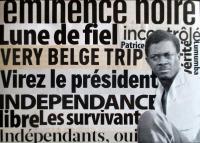 On June 30, 1960, at the ceremony for the proclamation of independence of the Congo, there were three speeches: from King Baudouin of Belgium, the former colonizing power, the President of the Congo, Joseph Kasavubu, and Patrice Lumumba, Prime Minister, the latter in an intervention not foreseen in the initial protocol. It was a short speech of about twelve minutes, written in an accessible and incisive language, performative and visual, a speech that, as the historian Jean Omasombo Tshonda defends, "founds the independent Congo". The first eight minutes are the clearest definition of what colonialism is from the point of view of a continent, a country, a community, a person.
On June 30, 1960, at the ceremony for the proclamation of independence of the Congo, there were three speeches: from King Baudouin of Belgium, the former colonizing power, the President of the Congo, Joseph Kasavubu, and Patrice Lumumba, Prime Minister, the latter in an intervention not foreseen in the initial protocol. It was a short speech of about twelve minutes, written in an accessible and incisive language, performative and visual, a speech that, as the historian Jean Omasombo Tshonda defends, "founds the independent Congo". The first eight minutes are the clearest definition of what colonialism is from the point of view of a continent, a country, a community, a person.
To read
01.02.2021 | by Margarida Calafate Ribeiro
 São Tomé and Príncipe, an archipelago on the Equator, boasts one of the most curious performances of popular imagination. Tchiloli is the fruit of cultural (and at times violent) encounters and creolisation. It is a delightful ethnodrama/ethnotheatre that unites music, movements and 16th century texts in one ceremony.
São Tomé and Príncipe, an archipelago on the Equator, boasts one of the most curious performances of popular imagination. Tchiloli is the fruit of cultural (and at times violent) encounters and creolisation. It is a delightful ethnodrama/ethnotheatre that unites music, movements and 16th century texts in one ceremony.
Stages
01.02.2021 | by Marta Lança
 A film is often supposed to be a means of communication, and following this principle, it seems interesting to gather different understandings in order to broaden one’s own vision, and that is precisely what the freedom of an experimental visual production can offer. This act of collecting is all the more interesting as it clusters understandings coming from viewers of different cultures. It is in this sense that the director, who has studied oriental languages - notably Persian - and has a great interest in Japanese culture, fosters the creation of multi-centricities, in this case a German-Nippon-Persian-tricentrism, into which viewers can immerse themselves and come out more enriched.
A film is often supposed to be a means of communication, and following this principle, it seems interesting to gather different understandings in order to broaden one’s own vision, and that is precisely what the freedom of an experimental visual production can offer. This act of collecting is all the more interesting as it clusters understandings coming from viewers of different cultures. It is in this sense that the director, who has studied oriental languages - notably Persian - and has a great interest in Japanese culture, fosters the creation of multi-centricities, in this case a German-Nippon-Persian-tricentrism, into which viewers can immerse themselves and come out more enriched.
Afroscreen
28.01.2021 | by Cheong Kin Man and Mathilde Denison